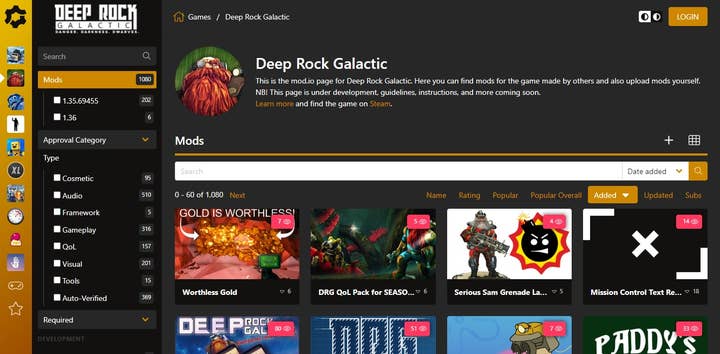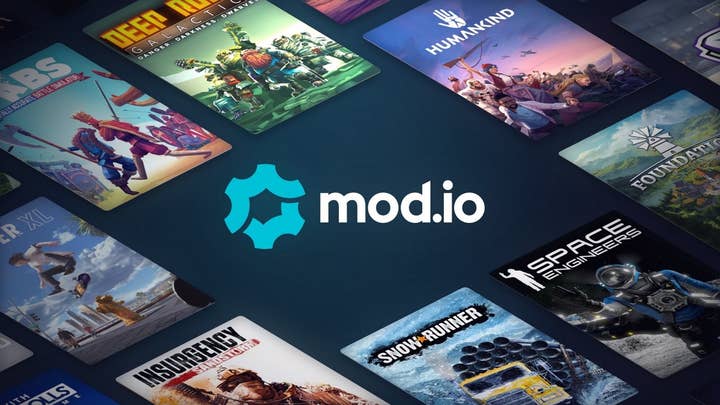Mod.io on "bringing legitimacy to the modding space"
CEO Scott Reismanis explains why he's high on UGC but not the metaverse, and the tension between modding and devs' desires for control
User-generated content (UGC) is getting a lot of attention and investment around the industry, and that's a good thing for Mod.io, a modding platform intended to help devs integrate the user modding experience into their own cross-platform titles.
Speaking with GamesIndustry.biz, Mod.io CEO and founder Scott Reismanis says there's been a "massive uptick" in interest around the space in recent years, a rising tide that should lift all boats in UGC waters.
"There's certainly a lot of interest and money going toward it, and there's a generation of gamers who will have grown up playing Roblox-like experiences and will be used to that creation and the marketplaces attached to it," Reismanis says. "Everything's sort of pushing in the right direction."
Also pushing in that same direction has been interest in building a metaverse, which Epic Games alone has raised $3 billion to build in the past year. And when companies articulate a vision alongside their massive metaverse funding rounds, it's often one driven by users creating content for other users.

Even though Reismanis has been out shaking the fundraising trees recently -- Mod.io raised $26 million in a Series A round last year -- he hesitates to embrace the metaverse, no matter how buzzy the term may be at the moment.
"Regarding the metaverse piece, from our perspective that's a very loaded term," he says. "And obviously you can't have a metaverse without content creation. The whole definition is really freedom of choice and decentralization to a certain extent.
"The vast bulk of people pursuing [the metaverse]... are probably never going to accomplish their goals because you've got a massive chicken-and-egg problem."
"But building a metaverse is a vey ambitious undertaking. It's a very loaded term, and the vast bulk of people pursuing that and putting big money toward it are probably never going to accomplish their goals because you've got a massive chicken-and-egg problem. You won't get the creators unless you've got the players, and you won't get the players unless you've got the creators. Overcoming that through attempting to buy it? I don't believe that's achievable."
Instead, Reismanis believes developers have to build a baseline experience that will draw people in to start with, and then gradually foster a creator/modding community that can build on to it. But that's not to say he's unenthused about the interest in UGC the current metaverse push is enabling.
"It's great for us and the investment's fantastic, but the vast bulk of those projects I think have a really tough road ahead because of what they're trying to do.
"We're really just focused on games that provide an amazing user experience from day one, and then why not let their creators expand on that universe through levels, content, skins, and everything else. It's a very conflated term right now. I think there will be pockets of success. It's going to be great for UGC and great for us, but maybe not the companies that are tackling it head-on, because only a few of them are going to find traction over a long period of time."
Another trend that's been going on a lot longer than the UGC bump -- and one that runs fairly counter to it -- is game publishers taking greater control. From not letting users run their own servers to constantly updating games-as-a-service to kernel-level anti-cheat programs, game makers have spent decades gaining more exacting control over every aspect of the user experience. In many ways, opening things up to modding and UGC requires them to let go of some of that control.
"We see that tension all the time," Reismanis says. "It's a really common thing. Especially with studios that are monetizing content, they wonder what impact modding is going to have on that existing business model."
Modding might not be a great fit for some games, Reismanis concedes, noting that makers of esports titles would be averse to anything that could conceivably give players a competitive edge. But even then, he has seen some companies implement sandbox modes and non-competitive spaces that allow for UGC implementation.
"Valheim and Minecraft are great examples that people do love running, spinning up, and maintaining their own servers. And they do love the freedom of choice and flexibility, and show the scale that even small teams can achieve when they do that. So I think modding's going to have a really strong place for the studios that approach it in the right way. They might see the industry's moving in this direction and they might see modding as a way to move in the other direction and benefit from the lack of creation that might be going on in certain parts of the industry."
"Roblox showed the scale you can hit when UGC is done in a very dedicated, focused manner and is built in a way that's beneficial for the players, the creators, and the studio from a financial standpoint"
He cites Paradox Interactive's Cities Skylines as one example. City-building strategy games were a somewhat stagnant genre before the game launched in 2015 with a mod-friendly focus and thrived. It's all part of the ebb and flow of the UGC trend, he says, and it's one that's clearly flowing right now.
"Roblox showed the scale you can hit when UGC is done in a very dedicated, focused manner and is built in a way that's beneficial for the players, the creators, and the studio from a financial standpoint," Reismanis says. "I think that was a lightbulb moment for many in the industry."
It's not just the success of Roblox that's driving interest in modding, either. Reismanis points to a number of different realities of development that collectively are pushing companies toward UGC as a natural answer.
"Shipping a title is hard and maintaining the quality and diversity of content for consumers is an expensive endeavor," he says. "Live service games continue to grow; premium titles aren't on the same path. Serving that need for content from your consumers... modding is really the ultimate way of accomplishing that. The fact it originates from your community means it's very organic. It's original, it's dynamic. It's fills all the niches and voids. There are no gaps in production. It's the ultimate way of serving that push towards subscription services."
And that's where Mod.io steps in.
"A big focus of ours is just bringing legitimacy to the modding space," Reismanis says. "Studios have always to some extent had modding as an ancillary feature, and we want to help bring a high level of polish to that. That means we're launching in-game UIs and plug-ins that make exploring mods feel as polished as it would exploring content that's made in-house by the studio."
For players, finding and using mods has often been a fiddly and potentially daunting task, one Mod.io aims to replace with "a Netflix-like browsing experience."
And for developers, the company wants to help give them better insight into why they should bother making mod-friendly games in the first place. The industry as a whole can point to the value of mods by looking at entire genres like MOBAs and battle royales that have their roots in user mods for popular games. But for an individual developer, it's been harder to put a number on it, particularly when the mod distribution is happening outside the game proper.
"We think mod creation could become a really valuable and impactful area for games, and that could become a profession in five to ten years"
"Anecdotally, we've always known modding is very impactful for studios and games that approach it in strong and interesting ways," Reismanis says. "But those developers have either had no access or control over those communities because they existed externally to any system they can touch. So really the metrics they have had has been restricted to download counts."
Exactly how that modding interest will be monetized varies, and Resimanis believes it's still "very early days" in the industry figuring out the best ways to go about that.
"There are different studios approaching it in various different ways," he says. "We believe there's a level of professionalism that monetization can approach, but we need to be really careful with how we present this to consumers to show there's really strong value, uplift, quality, and production that can be achieved when it occurs.
"We think it's still going to be a journey to go mainstream, and that's why Patreon and these more optional opt-in models are probably a pretty good place to start, and then build up and expand what developers can enable by using a platform like Mod.io going forward."
Eventually, he expects developers and publishers to inevitably not just embrace the modding community, but to internalize it, much as it has with community managers, influencers, and platforms like Twitch and Discord.
"Those weren't roles in the industry five or ten years ago, but now they're fairly covered and studios have added people for that on their payroll. We think mod creation could become a really valuable and impactful area for games, and that could become a profession in five to ten years. We'd love to enable that for studios' and creators' benefit."
But if game makers in the future see such value in modding that they would bring it in-house, wouldn't that potentially spell the end of a third-party platform like Mod.io? Resimanis thinks the opposite would happen.
"The legitimacy comes from how the content's organized, how the creators are managed and rewarded," he says. "There's a lot of functionality behind the scenes that needs to go into that, from community and content management to discovery algorithms to moderation and curation, to the marketplace and onboarding, creator payments... and then there's the in-game cross-platform technology that makes it work wherever the consumer may be, on console, PC, VR, or mobile.
"That's a massive undertaking, and not everything I've just described there -- which are features Mod.io provides -- are historically areas where studios haven't had any real expertise in."

